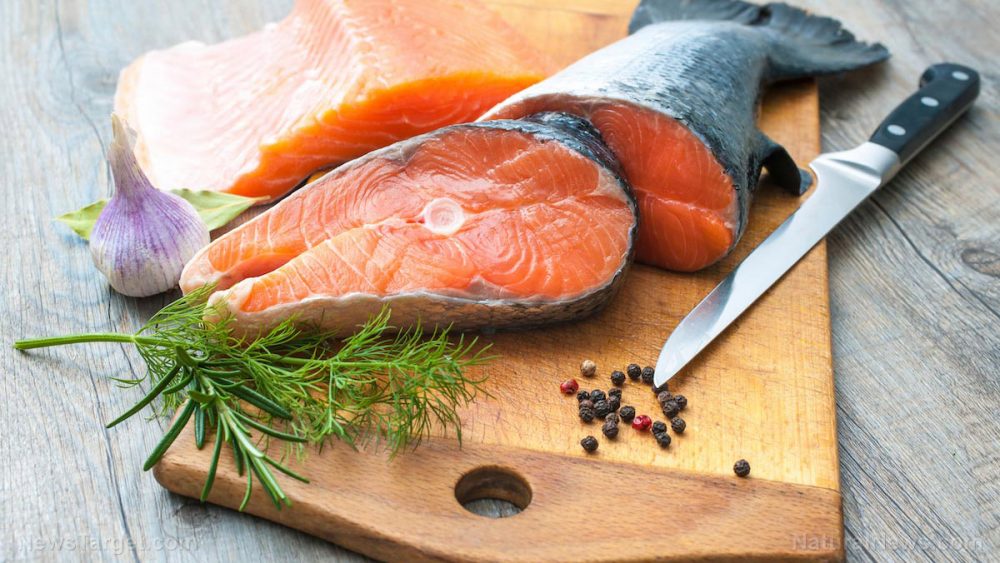
Advertisement
Salmon is a popular superfood because it’s both delicious and nutritious. But should you be eating salmon skin?
When cooking or eating salmon, most people leave the skin behind because it has a strange rubbery texture. While salmon is full of healthy fats, most of it is actually found in the skin.
Is it safe to eat salmon skin?
Fish in the ocean are exposed to toxins and pollutants. If these fish feed on creatures in contaminated water, the toxins get absorbed into the fatty tissues of their bodies. This is why salmon skin is removed: to reduce heavy metal exposure and lower your risk of consuming toxins.
You can still eat salmon skin, but only if it’s from wild-caught Pacific salmon which has fewer toxins than farmed salmon.
Salmon skin also contains beneficial omega-3 fatty acids. If you don’t want to eat rubbery salmon skin, don’t poach or steam the fish. When cooking salmon, leave the skin on so it acts as an insulator between the flesh and the heat of the pan. Cooking fillets with the skin on keeps nutrients and oils inside the salmon itself that might otherwise be lost in the preparation process.
Salmon skin is full of proteins and low in carbohydrates. A single serving of salmon skin has six grams of protein, good amounts of niacin, phosphorus and potassium, and traces of other essential minerals. Salmon skin also contains vitamins B and D.
Salmon skin has the highest concentration of omega-3 on the fish. Data suggest that these fatty acids can reduce triglyceride levels and lower your risk of developing heart disease.
A serving of salmon skin has about 107 calories. Like other kinds of food, salmon skin is good for you when consumed in moderation.
The health benefits of eating salmon skin
Like salmon meat, the skin offers several health benefits.
It boosts heart and brain health.
Salmon skin has omega-3 that helps prevent heart attacks. These fatty acids optimize brain function and they have anti-inflammatory properties. Eating salmon regularly will help lower your risk of developing conditions like Alzheimer’s disease and Parkinson’s.
It helps prevent osteoporosis.
According to a study conducted by researchers from Ohio State University, women who consumed the recommended daily amount of omega-3 showed a decline in hip fractures.
It can boost your vitamin D intake.
Salmon contains vitamin D, which makes it the perfect source of protein for those deficient in this essential vitamin. Vitamin D deficiency may cause arthritis, cancer, or even multiple sclerosis. Vitamin D is also crucial for bone health. (Related: Omega-3 improves quality of life of breast cancer survivors.)
Tips for cleaning salmon skin
It is important to clean the skin of wild-caught salmon so you don’t hurt yourself. Scale the fish so the scales don’t cut your mouth or get stuck in your throat.
First, place the fish on top of your sink. Spread a newspaper on the surface so you don’t make a mess. Remove the scales with a fish scaler, which you can purchase from most kitchen utility stores.
If you don’t own a fish scaler, use the blunt side of your knife to scrape off the skin. Apply only a little pressure if you’re using a knife to scale salmon. Brush the salmon to remove the remaining scales then wash it. Pat the salmon dry.
To remove salmon skin, use a sharp knife. The best tool to use is a fillet knife since you need to remove the skin starting from the tail. Cut the fish from the tail, make a slit on the skin, then pull the skin outward slowly. This will easily remove the skin from the flesh.
If you want a healthy dish full of omega-3, cook some wild-caught salmon and leave the skin on. Follow a nutritious diet and consume salmon skin in moderation to boost your brain and heart health.
Sources include:
Advertisements







